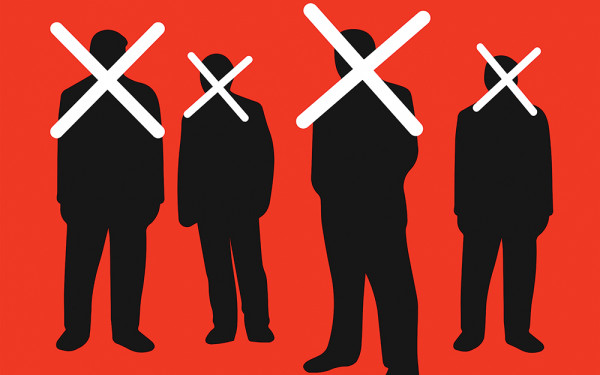How To Send a Message
Controversial BDS Posters Appear Downtown — Different Sides Weigh In
In recent months, social media users debated the ethics of sharing and retweeting photos of dead Syrian refugees, even if the images illuminated the true extent of the crisis.
Now, commuters downtown are confronted by posters featuring a dead Palestinian child, as the group Boycott, Divest and Sanction (BDS) Quebec tries to raise awareness about the international movement attempting to debilitate the Israeli state.
“I understand the strategy of shocking,” said Concordia University President Alan Shepard, who admitted he hadn’t seen the posters around campus yet. “I’m much more in favour of education rather than shocking.”
The posters have been seen attached to street light posts on de Maisonneuve Blvd. around the Concordia campus and near McGill on Sherbrooke St. Due to scheduling conflicts, BDS Quebec couldn’t be reached for comment by press time.
A referendum asking the Concordia Student Union to participate in the BDS movement against Israel passed in last fall semester’s by-elections, despite heated backlash and last-ditch appeals to have the question removed from ballots.
A pro-BDS group, organized by members of Concordia’s Solidarity for Palestinian Human Rights (SPHR), successfully campaigned for the initiative. But SPHR says it has no role in the street campaign.
“Unfortunately, when people look at that poster, they will automatically assume that SPHR is involved,” said Javier Hoyos, a member of the group and a key player in last year’s BDS campaign. “We are our own independent group. We have nothing to do with BDS Quebec.”
There are different ways to advocate for BDS and Palestinian human rights, according to Rami Yahia, another member of SPHR and a CSU councillor. He referenced the Montreal collective Tadamon!, which organizes cultural events to advocate for peace in the Middle East.
Concordia’s BDS campaign last year mainly used infographics and quotes from historical figures like Nelson Mandela to promote their cause, without becoming sensationalist, Hoyos adds. “We don’t necessarily approve of using the picture of a dead child to gather support or solidarity,” he said, describing the image as shocking.
For Yahia, the main concern is that the issue of illegal Israeli settlements on Palestinian land and the Palestinian people’s right of return is discussed here at Concordia and in Montreal. “Whether or not we agree with these posters, they’re going to stay there,” he said.
SPHR places more emphasis on organizing informational events like its recent talk downtown by award-winning journalist Robert Fisk, who spoke about his time covering conflict in the Middle East, Yahia adds.
The BDS Quebec signs are just another failed attempt for the BDS movement to legitimize themselves, according to Lauren Luz, president of Concordia’s Israel on Campus. She says the posters’ text, which makes claims that Israel “assassinates” Palestinian children, is false and in violation of federal campaigning laws.
“All of the students who I have spoken with are disgusted by the sensationalist tactics employed by BDS Quebec,” she said.
Plans for how the CSU will implement BDS are ongoing, according to Yahia, but he says an announcement about projects is coming up. Those projects though will be more informational than BDS Quebec’s sensational campaign, Hoyos says.
“You will not see SPHR use that tactic on our campus,” he said.

_900_600_90.jpg)
_600_832_s.png)


web_600_375_90_s_c1.jpg)

